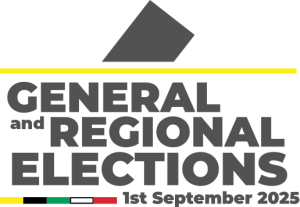Guyana’s general and regional elections on 1 September 2025 came and went without the turbulence many feared. The polls were described as peaceful, the procedures largely smooth, and voters did their part with calm discipline. But beneath the orderliness of election day lies a much deeper conversation—one about trust, fairness, and whether our electoral system truly gives every Guyanese an equal chance to participate and compete.
The Carter Center, which fielded 47 observers from 21 countries, visited 234 polling stations across all ten regions and later issued its preliminary report. The report makes it clear: while election day was managed well, structural reforms are urgently needed if Guyana is to build lasting confidence in its democracy (The Carter Center, 3 Sept. 2025).

General and Regional Elections Logo
What Worked Well
On polling day itself, the system held together. According to observers, stations opened on time, polling was calm and efficient, and procedures were followed consistently. Party agents from across the spectrum were present in nearly every location—the PPP/C in 97% of stations, APNU in 90%, WIN in 85%, and smaller parties in fewer numbers. The counting process was orderly, and for the first time, Statements of Poll (SoPs) were uploaded to GECOM’s website for public viewing, a positive step for transparency (The Carter Center report, Sept. 2025).
These are signs that the election machinery can work. But working machinery is not the same as a trusted system.
The Cracks Beneath the Surface
The Carter Center highlighted what many Guyanese already know: our elections are not played on a level field.
-
A voters’ list clouded by doubt: Although there was no evidence of a “bloated list,” the absence of a recent census and the continued presence of deceased names have fuelled public suspicion for years. The Carter Center urged GECOM to use its new legal tools to clean the list and even recommended an independent quality check before the next polls.
-
A politicised GECOM: Since the 1990s, the Carter–Price formula has ensured the two main parties dominate the Elections Commission. The result, according to the Center, is an institution paralysed by partisanship, leaving smaller parties without real access and eroding citizens’ faith in the process.
-
Misuse of state resources: Observers noted credible claims that government resources—state vehicles, public buildings, even official ceremonies—were deployed in ways that blurred the line between party and state. These practices may not always be illegal, but they are certainly unfair.
-
Barriers to inclusion: The law technically grants Commonwealth citizens resident in Guyana for a year the right to vote, while roughly 2,500 prisoners, including pre-trial detainees, remain disenfranchised due to a lack of rules. The Carter Center flagged both issues for urgent parliamentary review.
-
Information gaps: While GECOM did improve on communication—introducing tools like “Find My Polling Station” and publishing training manuals—critical information such as tabulation procedures was not made public ahead of time. That lack of clarity feeds suspicion, especially in such a polarised environment.
The Call for Reform
The Carter Center is not the first observer to say it, and it will not be the last: Guyana needs serious electoral reform. Their priority recommendations are clear:
-
Resume and properly fund the Constitutional Reform Commission, with reforms completed at least two years before the next vote.
-
Depoliticise and strengthen GECOM’s independence so that the Commission serves the people, not the parties.
-
Keep improving transparency by publishing polling, counting, and tabulation procedures in advance, and continue the real-time publication of SoPs.
-
Enact campaign finance rules that prevent misuse of state resources and level the playing field for smaller parties.
-
Audit and maintain the voters’ list with international best practices, supported by up-to-date census data.
Why This Matters
The European Union’s Election Observation Mission made a similar point: while Guyana’s elections remain competitive and voters turned out peacefully, “undue advantage of incumbency and legal gaps” continue to undermine trust (EU EOM, Sept. 2025).
This is more than paperwork and procedure. In a country undergoing rapid transformation through oil wealth, elections are the one moment when every citizen—rich or poor, urban or hinterland—has the same voice. If people lose faith that their vote matters, the foundations of democracy itself are weakened.


